Classics and the Western Canon discussion
Divine Comedy, Dante
>
Paradiso 19: Jupiter/Again the Question of the Virtuous Heathen
date newest »
newest »
 newest »
newest »
 http://www.lockportstreetgallery.com/...
http://www.lockportstreetgallery.com/...
Salvador Dali: Paradiso Canto 19. “In the Heaven of Jupiter.”
 http://www.worldofdante.org/media/ima...
http://www.worldofdante.org/media/ima...Sandro Botticelli: Paradiso Canto XIX.1. “Sixth Planetary Sphere (Heaven Of Jupiter); The Eagle Acknowledges Dante's Doubts as to the Damnation of Pagans and Speaks of the Unfathomable Nature of Divine Justice.” c.1480 - c.1495. Drawing.

 So... Dante doesn't really get an answer to his question, does he? The question itself is impertinent, or inappropriate for the human mind. Isn't the implication then that Justice is beyond human comprehension? Or is the implication that we shouldn't think about the justice of God, because we can never really understand it?
So... Dante doesn't really get an answer to his question, does he? The question itself is impertinent, or inappropriate for the human mind. Isn't the implication then that Justice is beyond human comprehension? Or is the implication that we shouldn't think about the justice of God, because we can never really understand it?
 Thomas wrote: "So... Dante doesn't really get an answer to his question, does he? The question itself is impertinent, or inappropriate for the human mind. Isn't the implication then that Justice is beyond human c..."
Thomas wrote: "So... Dante doesn't really get an answer to his question, does he? The question itself is impertinent, or inappropriate for the human mind. Isn't the implication then that Justice is beyond human c..."Perplexing, isn't it? Welcome back, dialectics?
(The Book of Job has always been a strange source of solace for me. Perhaps it is this need to stand before what is not understandable, while still always striving to understand? I am reminded once more of the story of a cadre of men in a concentration camp who put God on trial for injustice, condemned him (her?) as guilty, and then said what do we do? They chose to get on their knees and pray.)
 Lily wrote: "Perplexing, isn't it? Welcome back, dialectics?
Lily wrote: "Perplexing, isn't it? Welcome back, dialectics?I like that Dante is asking the hard questions, especially since he was not allowed to in Hell, with Virgil shushing him up all the time. Laurel pointed out that there is no music in Hell -- maybe there is no dialectics there either, for the same reason. In Paradise Dante can at least ask the question and marvel at its incomprehensibility.
 I just made a stream of consciousness connection between the swan in Dali's illustration above and the magnificent swan in the Met HD production of Parsifal on Saturday. Would have to think about whether there is more connection than the symbolism of majesty and beauty we tend to confer on this bird.
I just made a stream of consciousness connection between the swan in Dali's illustration above and the magnificent swan in the Met HD production of Parsifal on Saturday. Would have to think about whether there is more connection than the symbolism of majesty and beauty we tend to confer on this bird.(One of the things on my mental checklist to get to one day -- maybe -- is how different is the Roman eagle from the American bald eagle.)
 http://www.worldofdante.org/media/ima...
http://www.worldofdante.org/media/ima...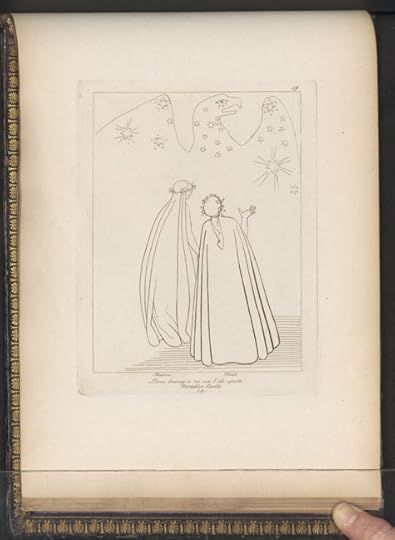
John Flaxman: Paradiso Canto XIX.1. “Eagle Appears Before Dante with Open Wings.” 1793. Engraving.
Thomas wrote: "..I like that Dante is asking the hard questions, especially since he was not allowed to in Hell, with Virgil shushing him up all the time ."
Did you think so? I had the opposite impression. I had thought that Virgil in Inferno had encouraged Dante to ask questions...that that was one of the things Dante would have to learn to do on this new path. Sometimes. I will grant you, Virgil didn't actually answer Dante's questions...but I remember at one point he chastized Dante, "You do not ask."
But I agree...gotta keep asking the questions even if one doesn't get answers.
Did you think so? I had the opposite impression. I had thought that Virgil in Inferno had encouraged Dante to ask questions...that that was one of the things Dante would have to learn to do on this new path. Sometimes. I will grant you, Virgil didn't actually answer Dante's questions...but I remember at one point he chastized Dante, "You do not ask."
But I agree...gotta keep asking the questions even if one doesn't get answers.
 http://etcweb.princeton.edu/dante/pdp...
http://etcweb.princeton.edu/dante/pdp...
Amos Nattini: Paradiso Canto XIX. "Parea dinanzi a me con l'ali aperte 1923
 http://www.worldofdante.org/media/ima...
http://www.worldofdante.org/media/ima...Giovanni di Paolo: Paradiso Canto XIX.82. “Instructive Value of the Scriptures for Humankind.” c.1450. Manuscript illumination. Yates Thompson 36. British Library

 Adelle wrote: "Thomas wrote: "..I like that Dante is asking the hard questions, especially since he was not allowed to in Hell, with Virgil shushing him up all the time ."
Adelle wrote: "Thomas wrote: "..I like that Dante is asking the hard questions, especially since he was not allowed to in Hell, with Virgil shushing him up all the time ."Did you think so? I had the opposite i..."
I think you're right, Adelle. I was thinking specifically about those places where Virgil loses his patience with Dante's compassion and hurries him along. He does allow Dante to ask questions, but they seem to be of a different order than what Dante is asking in Paradise.
I agree with you, too. I went back and rebrowsed. Personally, I had remembered that "you do not ask" and I think that really influenced my perception. In re-reading a bit, there IS quite a bit of "you aren't ready to understand yet/ let's keep going" type remarks from Virgil.
 Lily wrote: "Thomas wrote: "So... Dante doesn't really get an answer to his question, does he? The question itself is impertinent, or inappropriate for the human mind. Isn't the implication then that Justice is..."
Lily wrote: "Thomas wrote: "So... Dante doesn't really get an answer to his question, does he? The question itself is impertinent, or inappropriate for the human mind. Isn't the implication then that Justice is..."It is interesting to see how important the problem of Divine injustice - apparent or not - was for Dante. His study of the antique classics may have made it urgent.
But it is an eternal question. The point where - ultimately - we have to choose a direction.
 Wendelman wrote: "...It is interesting to see how important the problem of Divine injustice - apparent or not - was for Dante...."
Wendelman wrote: "...It is interesting to see how important the problem of Divine injustice - apparent or not - was for Dante...."One of the books that sits on my bookshelves with the mental label of "I really intend to at least skim your contents one day" is Bart Ehrman's God's Problem: How the Bible Fails to Answer Our Most Important Question-Why We Suffer. It is my understanding that it explores a question of divine justice that has been a crux of crisis on his faith journey.
The suffering.
The line I so remember from The Epic of Gilgamesh:
"And Enkido learned suffering."
The line I so remember from The Epic of Gilgamesh:
"And Enkido learned suffering."
 It was interesting to me that Dante's references to the Book of Job seemed so slight, given his strong interest in questions of justice. Did I miss things?
It was interesting to me that Dante's references to the Book of Job seemed so slight, given his strong interest in questions of justice. Did I miss things?
 "Just as from many coals we feel a single heat,
"Just as from many coals we feel a single heat,so from that image there came forth
the undivided sound of many loves." (21)
Dante (2012-07-18). Paradiso. (Kindle Locations 7831-7836). Random House, Inc.. Hollander Translation.
Another variant on the embers/coals figures of speech that I have been following. This has a sense of many bodies with unique selves, but one church.
 Three hundred years after Dante's poem, "On 7 January 1610, using his primitive telescope, astronomer Galileo Galilei saw four small 'stars' near Jupiter. He had discovered Jupiter's four largest moons, now called Io, Europa, Ganymede, and Callisto. These four moons are known today as the Galilean satellites."
Three hundred years after Dante's poem, "On 7 January 1610, using his primitive telescope, astronomer Galileo Galilei saw four small 'stars' near Jupiter. He had discovered Jupiter's four largest moons, now called Io, Europa, Ganymede, and Callisto. These four moons are known today as the Galilean satellites."http://solarsystem.nasa.gov/planets/p...
http://solarsystem.nasa.gov/images/P5...

Close-up of swirling clouds around Jupiter's Great Red Spot.
Any semblance of Dante's imagery of angels? (of course, such would be coincidental -- this was not the Jupiter seen in 1300!)
http://solarsystem.nasa.gov/images/Ju...
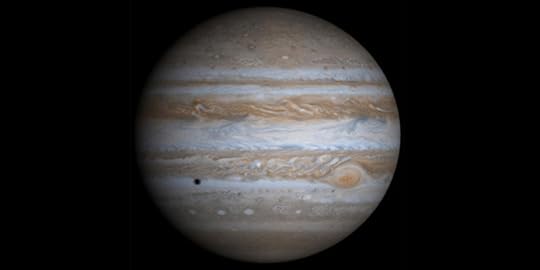
"A true-color image of Jupiter taken by the Cassini spacecraft. The Galilean moon Europa casts a shadow on the planet's cloud tops.
"Jupiter, the most massive planet in our solar system -- with dozens of moons and an enormous magnetic field -- forms a kind of miniature solar system. Jupiter does resemble a star in composition, but it did not grow big enough to ignite. The planet's swirling cloud stripes are punctuated by massive storms such as the Great Red Spot, which has raged for hundreds of years.
"Jupiter's appearance is a tapestry of beautiful colors and atmospheric features. Most visible clouds are composed of ammonia. Water vapor exists deep below and can sometimes be seen through clear spots in the clouds. The planet's 'stripes' are dark belts and light zones created by strong east-west winds in Jupiter's upper atmosphere."
http://solarsystem.nasa.gov//multimed...
 Numerous bird images appear in the cantos. Several are concentrated in these immediate ones, with the eagle obviously being foremost, with its connotations of majesty, (Roman) empire, freedom, and lofty strength.
Numerous bird images appear in the cantos. Several are concentrated in these immediate ones, with the eagle obviously being foremost, with its connotations of majesty, (Roman) empire, freedom, and lofty strength.But here is one of the falcon and a serendipitous link to a modern location with pictures of experiencing this ancient practice -- a discussion on another board just happened to lead here this morning!
Lines 34-39: (view spoiler)
Falconry today in Scotland: http://www.largeholidayhomes-blackcla...
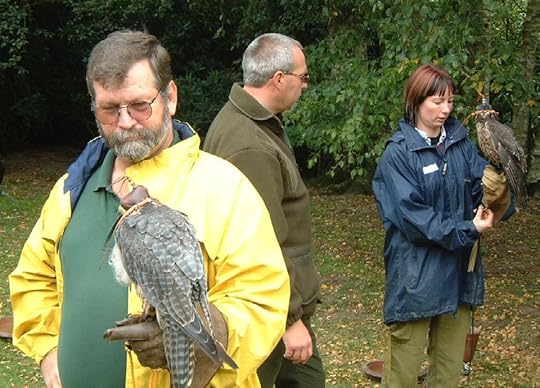
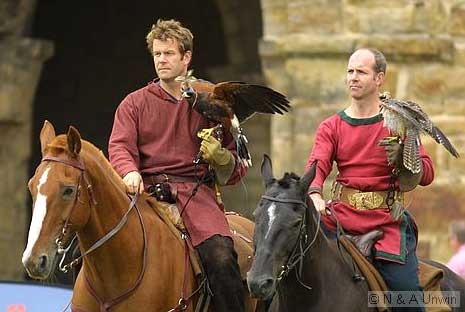
http://www.greydragon.org/trips/falco... -- another location in the UK, shows several types of falcons. Link to their trainer's site (2nd picture above).
 Somehow, the falcon, the eagle, and the stork seem considerable contrasts in bird images in this canto.
Somehow, the falcon, the eagle, and the stork seem considerable contrasts in bird images in this canto.Here is the stork passage: (view spoiler)
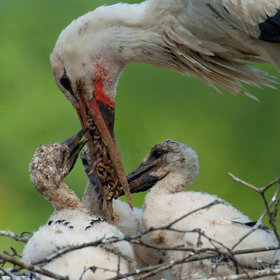
 Repeat, for reference, of Dore's image of the eagle comprised of many souls: http://www.worldofdante.org/media/ima...
Repeat, for reference, of Dore's image of the eagle comprised of many souls: http://www.worldofdante.org/media/ima...
 Hollander wrote in his notes for this canto: "In the assemblage of 15 crowned heads appearing here, Albert is the only one to be named, thus giving us a sense of how much knowledge of 'current events' Dante believed he could count on in his readers."
Hollander wrote in his notes for this canto: "In the assemblage of 15 crowned heads appearing here, Albert is the only one to be named, thus giving us a sense of how much knowledge of 'current events' Dante believed he could count on in his readers."Somehow, this comment seems to reinforce views expressed with Canto 33 that Dante had an intended audience for Commedia from whom he may have been trying to elicit certain actions?
Anyway, I found this list from Hollander most useful, since I had no idea (and little interest) in whom these wretched 1300's European rulers were. I subsequently sorted them in alphabetical country order and made a simple Excel bar graph showing the years of their reigns as presented here. Sort of a political view of Europe in 1300. Gave a pretty strong sense of Dante's s feelings across a wide swath. Now, what was the significance to what Dante may have been trying to accomplish?
12 Kings and 3 Other Kingdoms: (view spoiler)
 http://www.blakearchive.org/blake/ima...
http://www.blakearchive.org/blake/ima...
William Blake: Paradiso Canto XIX. "The Recording Angel." c. 1824-27.
Over the next few days, will try to fit in some Blake figures that Laurele helped me locate appropriately.
'What shall the Persians say then to your kings
when they see that volume lying open
in which their many infamies are all inscribed?' (114)
Dante (2012-07-18). Paradiso. Canto 19. (Kindle Locations 8056-8063). Random House, Inc. Hollander Translation.
See surrounding verses as well.




The Just Rulers composing the sign of the Eagle now speak as one voice, the voice of justice. Dante is emboldened to hope that he may at last learn the solution to a problem which has long troubled him, namely the exclusion from Heaven of virtuous heathens who have never heard of Christ. The Eagle replies that human intellect cannot explore the depths of divine justice; man cannot ask whether the judgements of God are just but only whether they are in accordance with the will of God. If so, they are just, for the will of God is the perfect standard of justice, of which our own is but a reflection. The Eagle then denounces the unjust rulers of contemporary Europe.